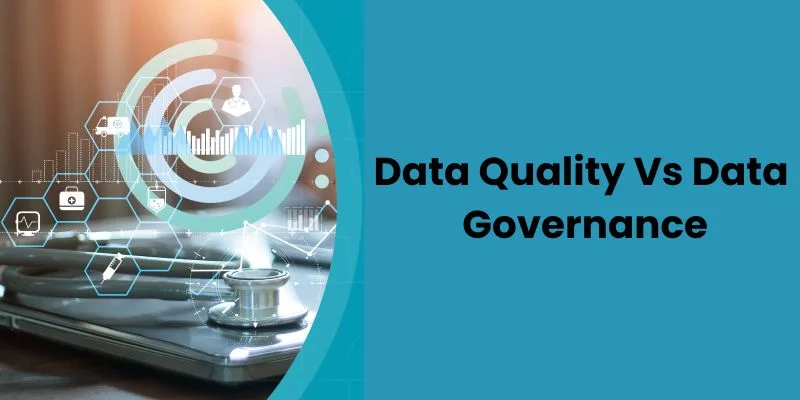Organizations seeking to become data-driven must prioritize both data governance and data quality. Despite being distinct practices, they share a basic relationship. Businesses frequently invest in data quality tools in the hopes that they will address their problems with data trust and accuracy. But before companies can lay the groundwork for enterprise-scale data quality, they require data governance. In this blog, we’ll discuss how Data Governance and Data Quality work best together and why businesses require data governance to enhance the quality of their data.
Data Quality
Accurate, comprehensive, consistent, and other data characteristics are called data quality. Organizations want reliable, solid data to make important decisions. They must adopt a data-driven approach with high-quality data, as untrustworthy data is untrustworthy. Missed opportunities, inefficiencies, and financial loss result from firms needing more confidence in their data to make meaningful business decisions. There is high demand for MBA Business Analytics in Chennai.
Data Governance
The term “Data Governance” refers to organizations’ procedures and methods to automate and standardize data usage and administration. It is a framework for power and supervision over handling data assets within an organization. A data governance framework serves as a common language for stakeholders, laying the groundwork for cooperation. Data governance offers a common language and platform for cooperation. Colleagues from different departments can analyze the same data and speak with each other using the same language. Furthermore, defining roles and duties removes ambiguity, facilitating data processes and communication. Let’s explore what overlap exists between Data Quality and Data Governance.
What overlap exists between Data Quality and Data Governance strategies?
Effective data governance is necessary for data quality. Before considering a separate enterprise-scale data quality instrument, organizations should ensure that they have established effective data governance.
Data governance is used by organizations for several purposes. Data governance affects a number of areas, including roles and responsibilities, integration, security, privacy, accuracy, compliance, and management. Organizations use data governance as a tool to:
- Boost data availability, utilization, and management transparency (supporting master data management)
- Standardize policies, procedures, and data systems.
- Fix data problems
- Assure adherence to organizational and regulatory requirements.
Each of these responsibilities is closely related to enhancing and monitoring Data quality. Effective data governance creates a common understanding of data quality and facilitates communication between data makers and users. There are many reputed colleges that offer Business Analytics Course in Chennai.
Even though the current data may need to be significantly reworked in order to improve its quality, the experience can be utilized to establish data governance policies & procedures for onboarding new data. From this overlap standpoint, combining Data Governance and Data Quality strategies from this overlap stand.
Differences Between Data Governance and Data Quality
Focus
- Data Quality: Concentrates on ensuring that data is accurate, reliable, and fit for use.
- Data Governance: Focuses on establishing policies, procedures, and standards for data management and usage.
Scope
- Data Quality: Involves specific activities aimed at improving data attributes.
- Data Governance: Covers broader strategic initiatives including data quality, data privacy, security, and lifecycle management.
Processes and Practices
- Data Quality: Includes data cleansing, profiling, standardization, and validation.
- Data Governance: Involves policy development, data stewardship programs, governance councils, and regulatory compliance. Explore MBA Colleges Near Me for best Business Analytics offering Colleges.
These are one of the main difference between Data Quality and Data Governance.
Responsibilities
- Data Quality: Managed by data quality teams and IT professionals focusing on technical data aspects.
- Data Governance: Involves cross-functional teams including senior management, legal, compliance officers, and data stewards.
Outcome
- Data Quality: Ensures data is accurate, reliable, and useful for analysis, reporting, and decision-making.
- Data Governance: Provides the framework and controls to manage data consistently and responsibly, ensuring security and compliance.
Key Characteristics
- Data Quality: Accuracy, completeness, consistency, reliability, timeliness.
- Data Governance: Policies and procedures, roles and responsibilities, data stewardship, compliance, data lifecycle management.
Importance
- Data Quality: Critical for reliable business analytics, decision-making, and operational efficiency.
- Data Governance: Essential for mitigating risks, ensuring regulatory compliance, and managing data assets effectively.
Beginning with Data Quality and Data Governance involves understanding their distinct yet complementary roles in data management. Start by establishing clear policies and responsibilities under a data governance framework while implementing processes to ensure high data quality. MBA Business Analytics Colleges in Chennai offers in-depth knowledge on Data Quality and Governance. Organizations can build a solid foundation for reliable data by focusing on both areas, driving informed decision-making and sustained business success.

